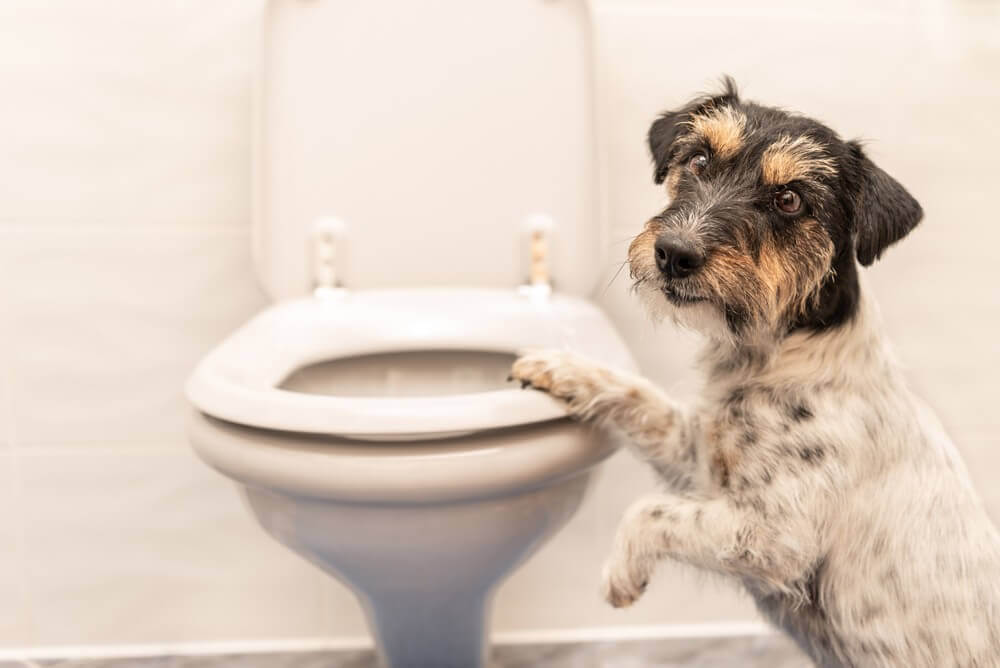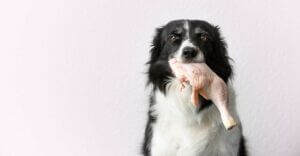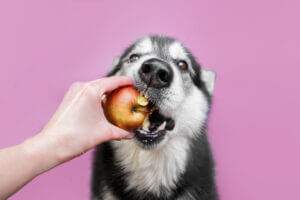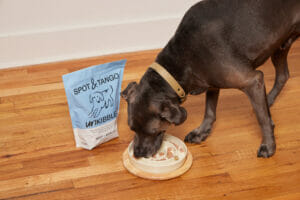Diarrhea in dogs is never fun for you or your dog. Stopping and preventing dog diarrhea is essential information for any dog owner. Diarrhea is common among dogs and nearly all dogs experience it at some point. Occasionally it will take the form of an upset stomach and other times it will be more severe.
As a pet parent, you know your dog will eat things they shouldn’t. Knowing how to stop dog diarrhea will come in handy in the future. And what better time to start learning how to help your pet than right after your dog’s digestive system purged whatever they ate?! Your dog may experience this symptom in varying extents, durations, and frequencies depending on age, diet, and temperament.
Why Are We Talking about Diarrhea?
Dog diarrhea bouts are the most common complaint reported to vets daily. Sometimes it’s something minor affecting the dog, and other times it’s more serious. Not knowing how to stop dog extensive or chronic diarrhea can be frustrating for you and painful for your pet. Severe cases require the immediate attention of your vet to determine the source and rule out life-threatening conditions.

In this article, you’ll learn about the causes and how to treat it. And did you know the color of your dog’s poop can tell you about their diarrhea?
What Causes Dog Diarrhea?
Your dog can get diarrhea when there’s a dysfunction or disruption in the gastrointestinal tract (GI tract).
Diarrhea is not a disease but is instead a symptom of dysfunction. Many things can disrupt your dog’s GI tract. For example, eating excessive grass is likely a minor issue, but having an object lodged in the stomach can be life-threatening.
Most Common Causes of Dog Diarrhea
Diet Change
A sudden diet change can upset your dog’s intestinal tract, stomach and cause diarrhea. Your dog’s digestive system takes a few days to adapt to new proteins.
Therefore, you should always go slow when switching your dog’s food and institute a gradual change.
If you’re wondering how to stop dog diarrhea caused by diet change, it’s generally recommended that you increase your dog’s new food slowly as you slowly decrease the current food over a week.
Dietary Indiscretion
Your dog can also get diarrhea when they overeat, eat rotten or spoiled food, or when they eat garbage. Some vets refer to it as garbage gut, and it usually means your dog ate something from table scraps, for example.
A dog’s digestive system is different so resist the temptation to feed your pup a little bit off your plate. Food with large amounts of sugar, fat, spices, flavorings, or salt can lead to diarrhea.
Bacterial Infections & Viruses
Your dog can pick up diarrhea-causing bacteria from different places, including improperly cooked or raw meat, decaying vegetables, or meat left sitting out for a while.
Dogs can also acquire bacterial infections from other animals that have it. Viral infections like distemper, Parvovirus (especially in puppies), and coronavirus (not COVID-19) can also cause diarrhea.
These viruses are usually very contagious and can be life-threatening. You should contact your vet immediately when your dog’s diarrhea is accompanied by vomiting, coughing, has lethargy, fever, or lack of appetite.
Parasites
Intestinal parasites can be picked up by your dog from a variety of sources. These include contaminated soil, outside water sources like stagnant water, ponds, and puddles or animal stools.
If your dog eats fecal matter of any variety (which most dogs find so tempting somehow) or drinks contaminated water, there’s a chance they may have consumed parasitic cysts.
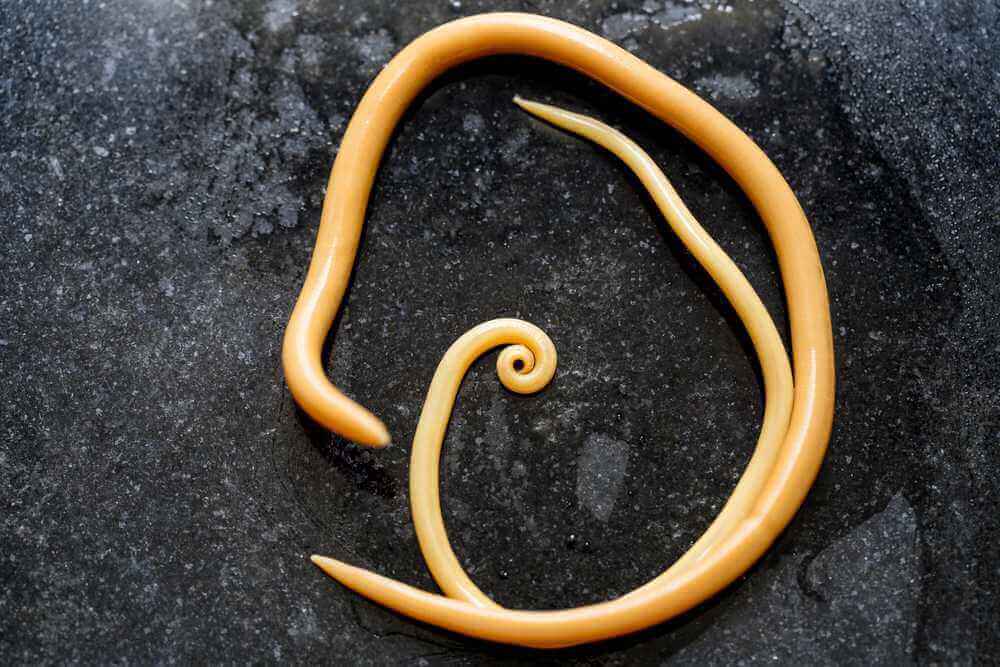
These can include hookworms, roundworms, and whipworms, and they can all cause diarrhea.
Indigestible Foreign Objects
Your dog’s curiosity will sometimes lead to the consumption of almost anything. Unfortunately, some foreign objects can get lodged in your dog’s small intestine or stomach.
This can lead to diarrhea, and it also poses a significant threat to your dog’s life. Watch out for signs of pain, abdominal tenderness, vomiting, lethargy, constipation, or aggressive behavior, and contact your vet immediately.
How To Treat Your Dog’s Diarrhea
When your dog is suffering from diarrhea, they need more of your care and attention.
Here’s what to do if your dog has this symptom:
1. Contact Your Vet
To ensure you’re on the safe side, contact your vet and inform them that your dog has diarrhea.
It’s a common issue, and they’ll ask you a few questions to determine the cause and whether treatment will be required.
Many cases are treatable at home with your vet’s advice.
2. Watch Out For Dehydration
Diarrhea leads to abnormal fluid floss that can cause dehydration. This is especially dangerous for juvenile dogs, puppies, and senior dogs because they can develop other complications if dehydrated.
Watch out for sunken eyes, lethargy, dry gums, or loss of appetite. Make sure that your dog has easy access to water and is drinking.
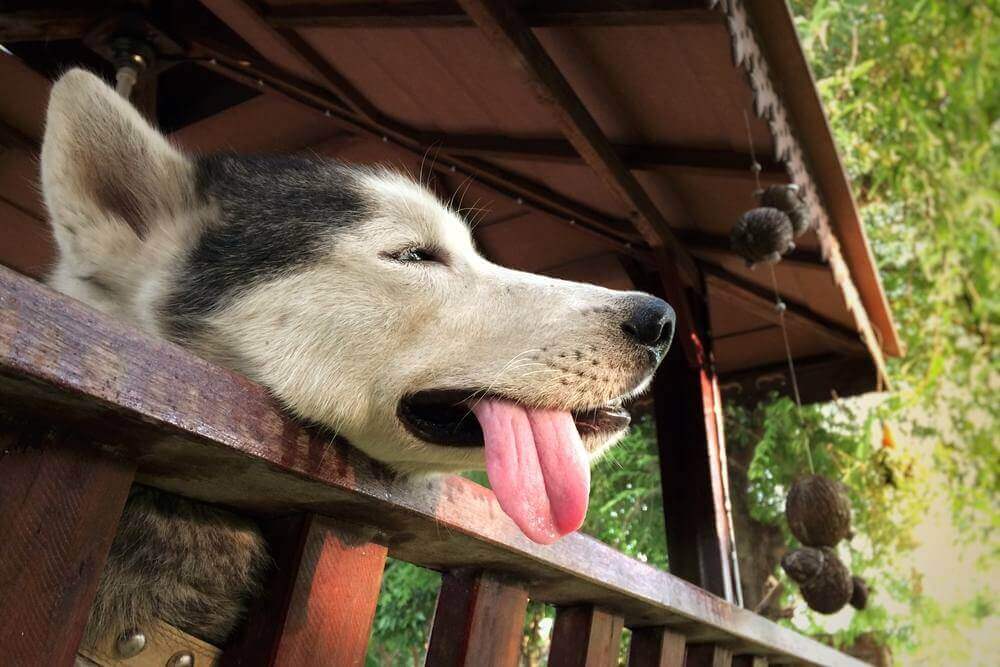
3. Fast Your Dog
If you’re trying to figure out how to stop dog diarrhea fast, then try withholding food for 12 to 24 hours while frequently giving your dog water in small amounts.
This will help clear the cause of diarrhea or upset and allow your dog’s gastrointestinal tract to settle.
Note that fasting is only recommended if your dog is a healthy adult. Geriatric dogs and pups under one year of age are at risk of low blood sugar if they don’t eat.
4. Feed Your Dog A Bland Diet
After fasting, introduce food slowly and start with bland foods that can help normalize your dog’s stool consistency. Some proven methods include:
- Rice water: Boil high-quality rice in plenty of water. Then remove the grains (by straining) and give what’s left to your dog.
- Plain, Unseasoned White Rice: Helps cure your dog’s diarrhea and prevent dehydration. It’s easily digestible and can absorb water in the GI tract to stabilize the stool.
- Canned Pumpkin: Alleviates canine diarrhea and constipation. Pumpkin powder made for pets is also an alternative if you can’t get canned pumpkin. Read more about the benefits of pumpkin for dogs.
- Probiotics or Yogurts: Contains beneficial bacteria that promotes digestion and alleviates diarrhea.
- Boiled Chicken: Easy on the stomach as long as it’s skinless, boneless, plain, and unseasoned. If your dog has chicken allergy, you can try other poultry meat, like duck or turkey.
Another option? Try dog food that’s designed with sensitive stomachs in mind.
Vet nutritionists at Spot and Tango formulated a range of dry UnKibble and wet Fresh recipes that are perfect for the sensitive stomach. The meals are easily digestible and easy on the stomach, so they can help prevent issues with diarrhea.
What Your Dog’s Poop Can Tell You
The color and consistency of your dog’s poop can tell you a lot about the cause of diarrhea and what’s happening.
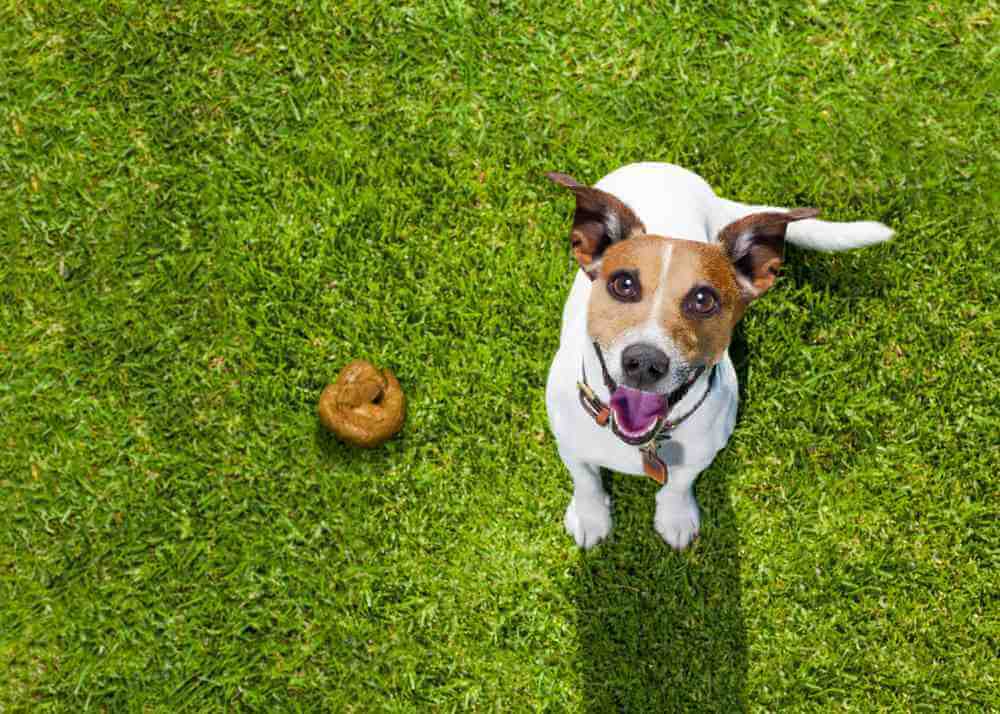
Carefully examine your dog’s poop if they have diarrhea to gather as much detail as possible for the vet. Look out for:
- Consistency – Canine fecal consistency is usually scored on a scale of one to seven. You can find a detailed explanation on this article from Healthline.
- Shape – Oddly shaped poop or poop with objects can explain you what your dog ate. White shapes like rice could signify a tapeworm infestation. Alternatively, strings, wood, or grass can reveal that your dog ate something they couldn’t digest.
- Frequency – When your dog poops small amounts several times in an hour, they may have large bowel inflammation. Three or more times with large volumes can tell you that there’s a disorder with the small bowel.
What Color Tells You About Your Dog’s Diarrhea
Your dog’s diarrhea color to help your vet figure out how to stop it and the root causes. Chocolate brown is standard, but other colors can indicate a more severe and significant internal problem.
Here are some color changes to look out for:
Red or Bloody Diarrhea
Bloody diarrhea can occur when small blood vessels in the lower part of your dog’s GI tract break open and bleed onto the stool. Small amounts of blood may not be much concern, but you should immediately take your dog to the vet if the stool is primarily blood.
Black Diarrhea
Black and tarry stool is very serious, and it occurs when blood is being digested before it’s passed. The poop can have a black or greenish color and look like newborn baby poop. It can indicate conditions like internal bleeding, bleeding ulcers, or foreign bodies, and you should contact your vet immediately.
If you’re worried about your pet’s poop color in general, it could be time for a change in pet food. Our Spot and Tango range of dog food contain ingredients that are packed with nutrients but gentle on the tummy. You can even create a recipe that’s suited to your dog’s unique profile by using the Spot & Tango meal planning feature.
Frequently Asked Questions
How To Stop Puppy Diarrhea?
Stopping puppy diarrhea depends on the cause. You can usually stop mild diarrhea caused by diet change or stress through a bland diet.
You should never fast young puppies. Always consult the vet first to rule out anything severe and provide your puppy with plenty of fresh water.
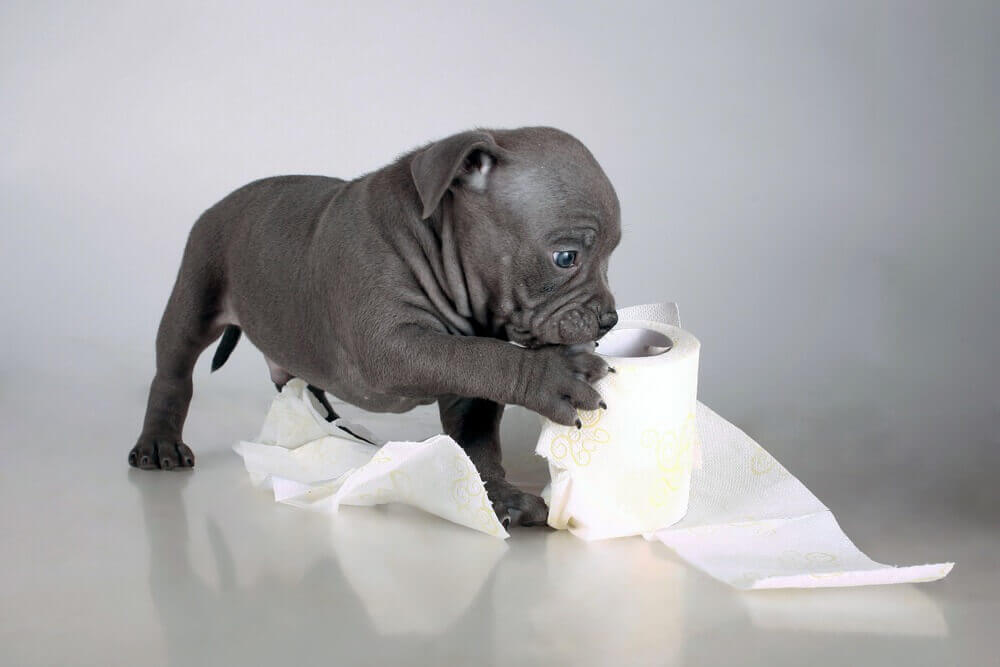
How To Stop Dogs Pooping At Night?
Firstly, don’t reprimand your dog as this will only make them fear you. Second, teach your dog to go outside and reinforce the lessons positively. Thirdly, you need to be patient until your dog understands the routines of your house. You can also change feeding times and amounts before bedtime to eliminate the problem.
How To Stop Dog Diarrhea Fast?
If you’ve been trying to figure out how to stop dog diarrhea fast or how to stop diarrhea and vomiting, then you should first try fasting your pet for 12 to 24 hours.
Ensure they have access to water to prevent dehydration. Once it has stopped or slowed, give them a bland meal. Additionally, give your dog probiotics to help regulate the immune system and your dog’s gut. Ideally probiotics also alleviate the vomiting and looseness of the bowels.
Final Thoughts
Sometimes diarrhea is unavoidable for humans and dogs alike. Sometimes, your pet just ate something wrong or had a case of an upset stomach.
There’s every reason to believe that you can manage the treatment of your pet at home. The first step is to limit your dog’s food intake for a few hours to give things time to settle down.
Then, consider your options for a new dog food that’s better suited to your pet’s stomach. Consult our range of recipes to find the best option that suits your best friend’s specific diet requirements.


